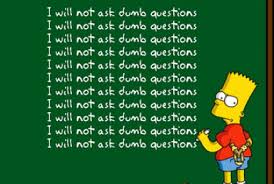The value of dumb questions
Being an outsider, as I have been for most of my life, brings with it a feeling of inadequacy. To hide this feeling, I did what many others do – I would preface questions with ‘Hey, I am new here….may I ask a dumb question?’ Today, I care less about what people think of me, and more about the value of asking back-to-basics questions.
Let me explain with a couple of instances from the early part of my career –
My first job as a research analyst was a project assignment to research the unlisted property funds segment (called real estate private equity in India). My boss focused on assessing the manager skill while I was to evaluate the prospects of the real estate portfolio. Naturally, I asked about the managers’ views of future demand/supply and their strategy to increase rents and valuations.
My dumb question – how much of those prospects were built into the current valuation, therefore the net asset value (NAV) of the fund units? Could I check the valuation reports of all the properties in the portfolios?
It turned out everything they had told me was already built into the valuations. Needless to say, this insight changed the conclusions.
My second example also relates to real estate valuations. We were researching ‘mortgage funds’ which were essentially real estate debt funds; they gave business loans against commercial real estate, typically on 60-70% loan-to-valuation ratios for 3 years terms. The interest would be 2-3% higher than bank bills. The NAV would stay constant. Overall, this type of fund appealed to retirees. One particular fund preferred to secure the business loans against homes of the borrowers, rather than their commercial real estate. The residential real estate security supposedly made the loans less risky.
My dumb question – isn’t residential real estate more prone to bubbles because its valuations are made on simple ‘comparable sales’ method rather than on the more robust ‘yield comparisons’ or ‘discounted cash flow’ methods? Doesn’t this difference mean that the fund could have lower security margins if the valuations of those homes dropped?
I wonder if this insight would have been useful to the investors in sub-prime loans.
I have many more such examples. The more important point is the value of such ‘dumb’ questions. My learnings –
The value of diversity
As I mentioned before, these questions came out of a feeling of inadequacy combined with the determination to do a good job. Not only was I a new immigrant to Australia, I didn’t have a relevant degree from a reputable university. Yet, my job depended on the outcome of the project. Years later when I joined one the world’s largest institutional consulting firm, I rubbed a lot of colleagues up the wrong way by asking similar basic questions. I was a young, Asian, Arts-graduate woman amongst the older, white, actuarially-qualified men. (Ironically, apparently I am still the outsider in the Indian industry, this time because I haven’t worked in India).
My learning is that it’s important to include people from diverse backgrounds in teams and then encourage them to ask questions. They will try harder. This strategy may test the patience of incumbents but is likely to lead to better results in the long-term.
The value of independent research
The managers of the funds, that I put these questions to, were not amused. They would call my boss and complain about how preposterous it was that senior professionals had to answer naïve questions from pimple-faced fresh graduates. However, our research firms had been hired by the wealth management and pension fund industry to conduct independent research on the funds, so we continued to do so.
My learning is that external research is hugely valuable, but it has to be independent i.e. not paid for by the product providers. Otherwise, it could cause more harm than good. (I will write separate longer posts on this topic).
The value of questions rather than answers
I have provided ratings and recommendations, basically answers, throughout my career as a researcher and consultant. Research firms require significant, increasingly global, resources. Yet investors don’t appear to appreciate that the answers are informed opinions, not crystal-ball forecasts. Investors also seem less inclined to pay for independent research in spite of the increasing need for it. (Remember, the AAA-ratings on CDOs during the crisis?)
My learning is that I could be more effective as an educator, helping investors to ask better questions, than as a researcher providing answers.
That is what I have decided to do.
I have set up two sites –
MoneyManagementIndia.net – aimed at wealth industry professionals, where I ask questions of leading industry experts on wealth management and portfolio construction in India. Investors can then use our questionnaire templates @DiligenceVault to research and conduct due diligence individual funds. This is taking me a while…
(By the way, if you are still curious about real estate valuations, see this interview).
TheMoneyHans.com – aimed at non-professional investors (with no prior finance knowledge), where I tackle frequently-asked personal finance questions with factors you need to consider to answer the question yourself.
What’s your ‘dumb’ money question? I would love to hear from you, either in comments below now, or through the social media pages of the relevant site later. Please share so we can collate more questions. I won’t promise answers, but I hope I can help you answer them yourselves. As I said, there are no dumb questions.




You must be logged in to post a comment.